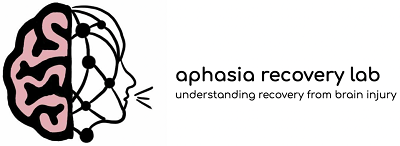In order to learn more about aphasia recovery, we are conducting a study to further understand how those with aphasia recover language during the first year after a stroke. Using a multitude of new neuroimaging and behavioral research techniques, this study looks at changes in the brain of stroke survivors during the first few years post-stroke as they regain their language skills.
Most individuals with aphasia have difficulty producing words and sentences, which impairs their ability to communicate naturally. Some people with language deficits recover better than others, and we still don’t know why. Our study looks at changes in different structures of the brain as they contribute to the recovery of language.
We aim to assess language abilities at several time points in the first year post-stroke. At the same timepoints, participants will get an MRI scan to track neural changes as their language recovers. Through analysis of recovery patterns we hope to have a better understanding of how different brain regions contribute to recovery. In the end, we hope this will allow clinicians to give the most accurate diagnosis, prognosis, and effective treatment to date to people with aphasia.
As a part of this study, we are also seeking to recruit individuals with chronic aphasia resulting from a stroke that happened at least one year ago. We will be testing our participants with a similar behavioral protocol and conducting an identical MRI scan to the main group with acute aphasia. These individuals will be tested twice, one year apart. This data will help us understand how recovery in the first year is different from continued recovery at the more chronic stages.
